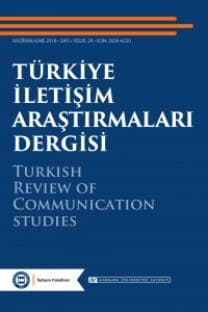Kovid-19 İzleme Uygulamalarında Ödül Mekanizmaları ve Sürdürülebilir Yenilik Süreçlerinde Gönüllü Kamusal Katılım Üzerinde Etkileri
Kovid-19, izleme uygulamaları, ödül mekanizması, gönüllülük, Beşli Sarmal İnovasyon Modeli
Reward Mechanisms in COVID-19 Tracking Apps and Its Impact on the Voluntary Participation of the Public in Sustainable Innovation Processes
COVID-19, contact tracing, reward mechanism, voluntariness, Quintuple Helix Innovation model,
___
- Altmann, S., Milsom, L., Zillessen, H., Blasone, R., Gerdon, F., Bach, R., Kreuter, F., Nosenzo, D., Toussaert, S., & Abeler, J. (2020). Acceptability of app-based contact tracing for COVID-19: a cross-country survey study. JMIR mHealth and uHealth, 8(8), e19857. https://doi.org/10.2196/19857
- Binnewies, C., & Groening, C. (2019). Achievement unlocked! The impact of digital achievements as a gamification element on motivation and performance. Computers in Human Behavior, 97, 151-166.
- Bracken, C. C., Jeffres, L. W., & Neuendorf, K. A. (2004). Criticism or praise? The impact of verbal versus text-only computer feedback on social presence, intrinsic motivation, and recall. CyberPsychology& Behaviour, 7(3), 349–357.
- Bygrave, L. A. (2002). Data protection law, approaching its rationale, logic and limits. The Hague/New York: Kluwer Law International.
- Carayannis, E. G., Barth, T., & Campbell, D. F. J. (2012). The quintuple helix innovation model: global warming as a challenge and driver for innovation. Journal of Innovation and Entrepreneurship 1(2). https://doi. org/10.1186/2192-5372-1-2.
- Csikszentmihalyi, M. (1990). Flow: The Psychology of Optimal Experience. New York: Harper & Row. Davalbhakta, S., Advani, S., Kumar, S., Agarwal, V., Bhoyar, S., Fedirko, E., Misra, D. P., Goel, A., Gupta, L., &
- Agarwal, V. A. (2020). A systematic review of smartphone applications available for coronavirus disease 2019 (COVID19) and the assessment of their quality using the mobile application rating scale (MARS).” Journal of Medical Systems, 44(9).
- Deci, E. L. (1972). Intrinsic motivation, extrinsic reinforcement, and inequity. Journal of Personality and Social Psychology, 22(1), 113–120.
- Ertiö, T. P., Ruoppila, S., Thie,l S. K. (2016). Motivations to Use a Mobile Participation Application. In: Tambouris, E. et al. (eds) Electronic Participation. ePart 2016. Lecture Notes in Computer Science (Vol 9821). Cham: Springer. https://doi.org/10.1007/978-3-319-45074-2_11.
- European Data Protection Board. (2021). Retrieved from https://edpb.europa.eu/sites/default/files/files/file1/ edpb_guidelines_20200420_contact_tracing_COVID_with_annex_en.pdf last access 25.11.2021
- Gallego, A., Gaeta, E., Karinsalo, A., Ollikainen, V., Koskela, P., Peschke, L., Folkvord, F., Kaldoudi, E., Jämsä, T., Lupiáñez-Villanueva, F., Pecchia, L., & Fico, G. (2021). HCI challenges in designing pandemic trace applications for the effective knowledge transfer between science and society inside the quadruple helix collaboration. In Kurosu, M. (Ed.) Human-Computer Interaction. Interaction Techniques and Novel Applications (pp. 390-401). Berlin: Springer (ISBN: 978-3-030-78464-5).
- Hsia, T.-L., Chiang, A.-J., Wu, J.-H, Teng, N.N.R., & Rubin, A. D. (2019). What drives e-health usage? Integrated institutional forces and top management perspectives. Computers in Human Behavior, 97, 260-270.
- Hayat Eve Sığar (2020). HES kodu nedir. Retrieved from https://hayatevesigar.saglik.gov.tr/hes.html
- Jelinek, A. (2020). Letter to the Head of Unit European Commission to Oliver Micol. Retrieved from https:// edpb.europa.eu/sites/default/files/files/file1/edpbletterecadvisecodiv-appguidance_final.pdf
- Klar, R., & Lanzerath, D. (2020). The ethics of COVID-19 tracking apps – challenges and voluntariness. Research Ethics 16(3-4), 1-9.
- Kiili, K., de Freitas, S., Arnab, S., & Lainema, T. (2012). The design principles for flow experience in educational games. Procedia Computer Science, 15, 78-91.
- Koster, R. (2005). A theory of fun for game design. Scottsdale, AZ: Paraglyph Press.
- Lopez, S. J., & Snyder, C. R. (2009) The Oxford Handbook of Positive Psychology (2nd ed.). Oxford, GB: Oxford University Press, 88-102.
- Ming, L. C., Untong, N., Aliudin, N. A., Osili, N., Kifli, N., Tan, C. S., Goh, K. W., Ng, P. W., Al-Worafi, Y. M., Lee, K. S., & Goh, H. P. (2020). Mobile health apps on COVID-19 launched in the early days of the pandemic: Content analysis and review. JMIR mHealth and uHealth 8(9). https://doi.org/10.2196/19796.
- Peng, W., Kanthawala, S., Yuan, S., & Hussain, S. A. (2016) A qualitative study of user perceptions of mobile health apps. BMC Public Health 16, 1158. https://doi.org/10.1186/s12889.016.3808-0
- Peschke, L., Çataloğlu, B., Ceylan, N., Dionio, P., Dündar, I., Folkvord, F., Gaeta, E., Gallego Montejo, A., Geli, S., Gümüş Ağca, Y., Güneş Peschke, S., Yüksel, A. G., Gyftopoulos, S., Kaloudi, E., Kapusuzoğlu, A., Karinsalo, A., Koskela, P., Oğuz, Ö., Ollikainen, V., & Seyfafjehi. S. (2021) Review about good practices of quadruple helix collaboration processes and developments of COVID-19 tracking apps and platforms. Retrieved from https://www.pandevita.eu/images/D3-1_GoodPractices-CTAs.pdf
- Robert Koch Institute (2021). Kennzahlen zur Corona-Warn-App. Retrieved from https://www.rki.de/DE/ Content/InfAZ/N/Neuartiges_Coronavirus/WarnApp/Archiv_Kennzahlen/Kennzahlen_18022021. pdf?__blob=publicationFile
- Servick, K. (2020). COVID-19 contact tracing apps are coming to a phone near you. How will we know whether they work? Retrieved from https://www.sciencemag.org/news/2020/05/countries-around-world-arerolling- out-contact-tracing-apps-contain-coronavirus-how. doi:10.1126/science.abc9379.
- Silvennoinen, J., Vogel, M., & Kujala, S. (2014). Experiencing visual usability and aesthetics in two mobile application contexts. Journal of Usability Studies 10(1), 46-62.
- Theile, G. (2020). Teure Werbekampagne. Wie die App jetzt populär werden soll. Retrieved from https://www. faz.net/aktuell/wirtschaft/digitec/teure-werbekampagne-wie-die-corona-app-jetzt-populaer-werdensoll- 16817510.html.
- Terhorst, Y., Philippi, P., Sander, L. B., Schultchen, D., Paganini, S., Bardus, M., Santo, K., Knitza, J., Carvalho Machado, G., Schoeppe, S., Bauereiß, N., Portenhauser, A., Domhardt, M., Walter, B., Krusche, M., Baumeister, H., & Messner, E. M. (2020). Validation of the mobile application rating scale (MARS). PLOS ONE, 15(11), e0241480.
- Wang, H., & Sun, C.-T. (2011). Game Reward Systems: Gaming Experiences and Social Meanings. Proceedings of DiGRA 2011 Conference: Think Design Play. Retrieved from http://www.digra.org/wp-content/ uploads/digital-library/11310.20247.pdf
- Başlangıç: 1992
- Yayıncı: Marmara Üniversitesi
Sürdürülebilir Tüketim, Anti Tüketim Akımları ve IKEA Buy Back Friday Hareketi
Sürdürülebilirlik İletişimi ve Halkla İlişkiler
Simge ÜNLÜ, Lütfiye YAŞAR, Erdal BİLİCİ
Şirket Sürdürülebilirlik İletişiminde Hedef ve Pratikler: Doğuş Otomotiv Örneği
Başak SOLMAZ, Bahar URHAN, Havva Nur TARAKCI, Doğan Can GAZAZ
Duygu KOTAN TÜRKDEN, Yeliz KUŞAY
Lutz PESCHKE, Seldağ GÜNEŞ PESCHKE, Yasemin GÜMÜŞ AĞCA, Seyedehshahrzad SEYFAFJEHİ, Irmak DÜNDAR, Yasin AYDOĞDU
